2019 Gas Gas EC250/300: Pros vs Cons
When we first get our mitts on new-model motorcycles, we like to scrutinise the hell out of the things. Aside from riding the machines to get a feel for how they perform, we also spend as much time as we can analysing their component spec, design elements, and maintenance issues (such as fastener commonality, range of adjustment, protective parts, ease of access for servicing, etc, etc). After all, the ownership experience with any motorcycle is a reflection of these small but important things; not simply how well the bike performs when it’s brand spankers.
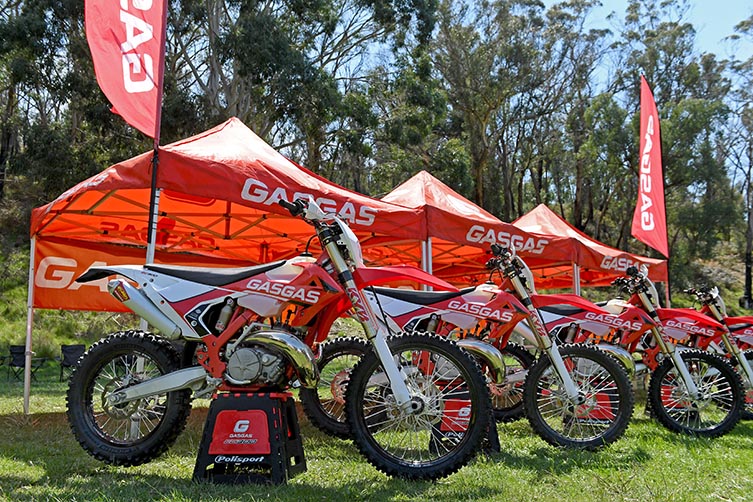
So, here’s a top-line list of pros and cons we noted about Gasser’s 2019 enduro models – the EC250 and EC300 – at the recent Australian media launch. Admittedly, the hard-nose enduro bikes that come out of Europe these days (and by that, we mean KTM, Husqvarna, Beta, Sherco and Gas Gas) run plenty of top-shelf componentry, but it’s still well worth identifying what stands out (good, and not so good) on Gasser’s new enduro models, which come with a sweeping mods for 2019.
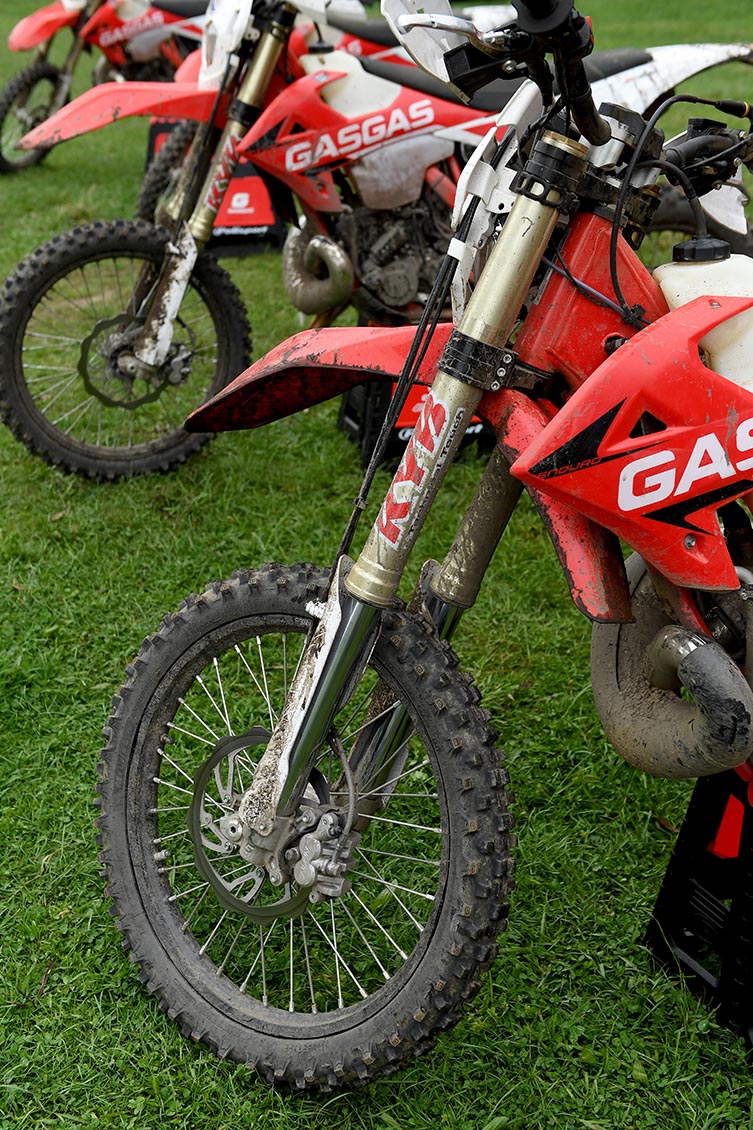
THE PROS
- The KYB suspension (AOSS-style twin-chamber fork and Technical Touch-tuned shock absorber) is a top-shelf package. The combo of the Japanese suspension and a European-style, single-backbone chromoly frame creates a superb-handling rolling chassis.
- AN FMF muffler is standard equipment (the expansion chamber is not branded, but it’s indistinguishable from the FMF pipe that comes on Gasser’s cross-country models).
- The fuel tank is a generous 10 litres (remembering two-strokes are always thirstier than four-strokes). Plus it’s made from a clear plastic, meaning you can see your fuel level at a glance.
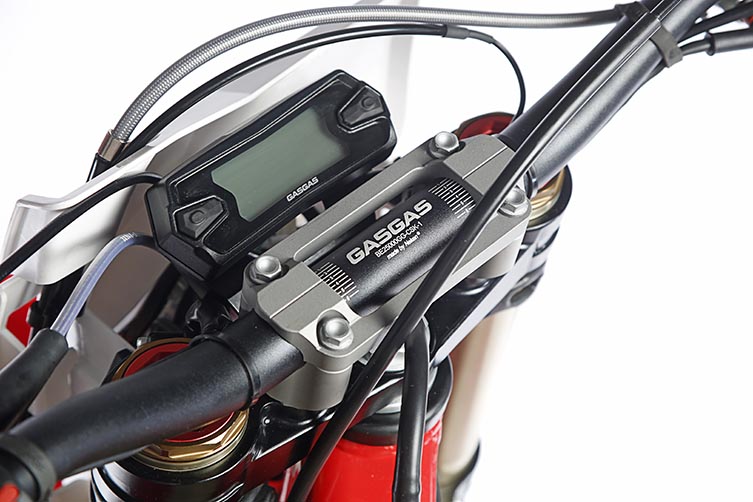
- Good adjustability (four-position for handlebars, two positions for rear brake pedal tip, and the new bar-mounted switch with dual ignition maps offers convenient on-the fly power tunability to suit changing conditions).
- Quality hand guards and bashplate come as standard equipment.
- Extended frameguards (now in red) to protect frame paint.
- Nissin brakes have plenty of power and a very progressive feel.
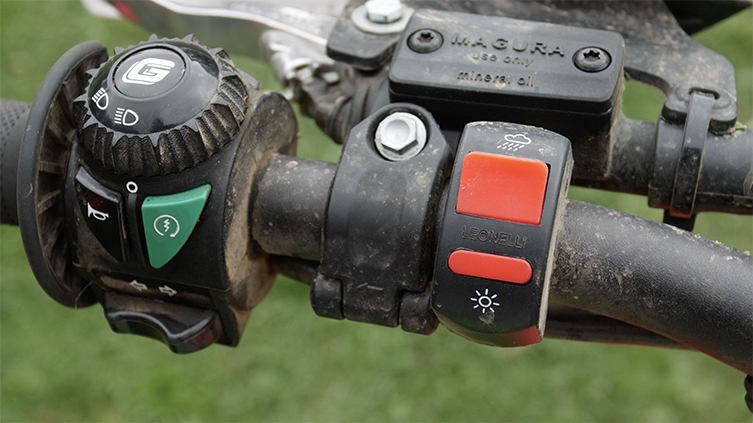
- Magura hydraulic clutch has a super-light lever-pull.
- Quality Neken tapered alloy handlebars.
- The upper bar mount is bridged for added strength.
- Black-anodised billet triple clamps.
- The upgraded electric-start componentry works a treat.
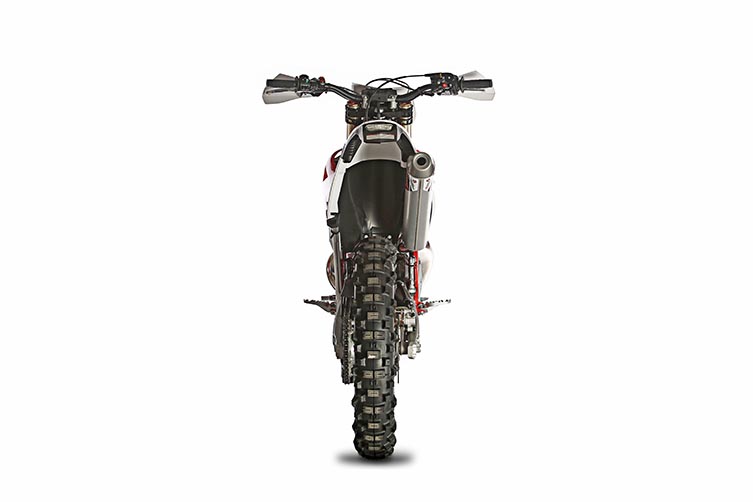
- The shorty rear tailguard extended (and integrated tail-light) is neat and robust.
- Large, quality footpegs.
- Quality alloy sidestand.
- Rubber-mounted headlight.
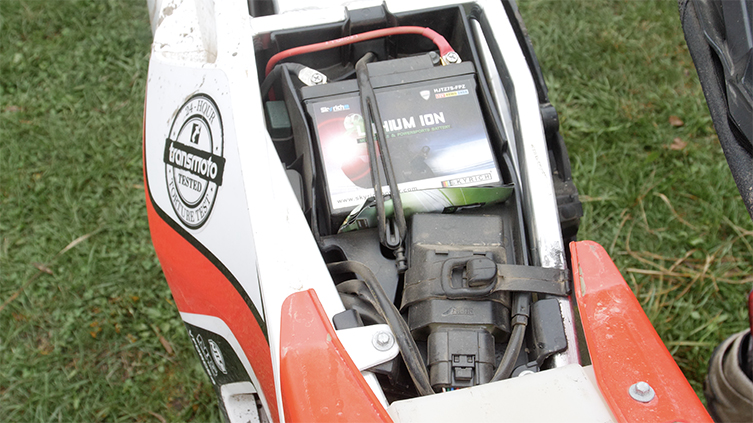
- V-Force4 reed block.
- Digital speedo with plenty of useful functions.
- Michelin’s new Enduro tyres (FIM/DOT-approval) front and rear.
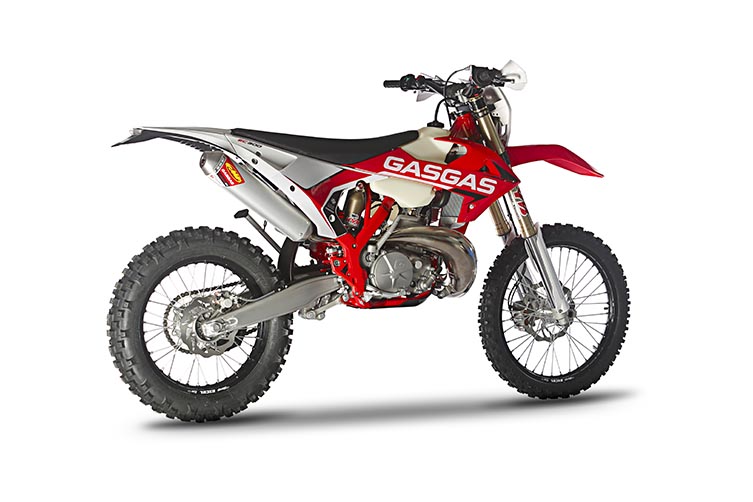
- Inlaid radiator shroud graphics (plus the overall graphics package is minimalist, but stylish).
- The added plastic tab, designed to better secure the 2019 models’ LHS sideplate (which doubles as an airbox cover) makes sense because the 2018 bikes were losing those covers in extreme terrain a fair bit.
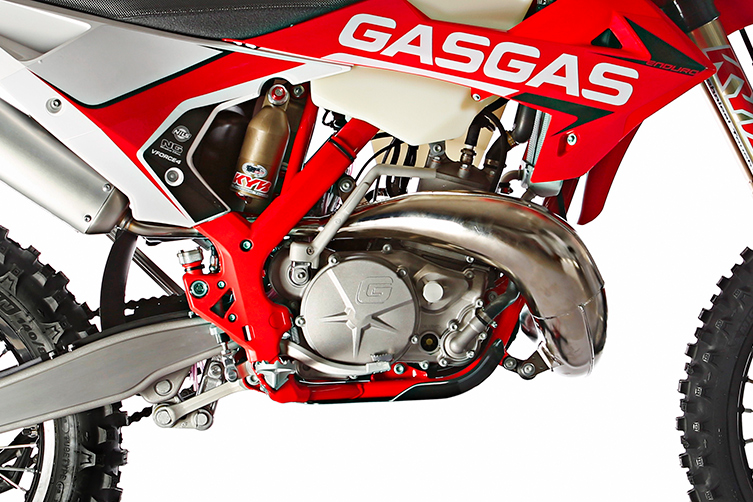
- Ease of maintenance – just three bolts to remove fuel tank, bevelled edges on plastics to minimise snagging and wear, spark plug can be removed with tank in situ, holes in bashplates allow access to sump and crankcase drain bolts, simple wiring harness that all sits on one plastic tray under the seat, hex-head bolt now used for oil filler cap (this replaced last year’s Allen-head bolt that easily filled with mud), spring-loaded strop makes air filter removal/replacement a cinch, and excellent fastener commonality means your bumbag can remain lightweight.
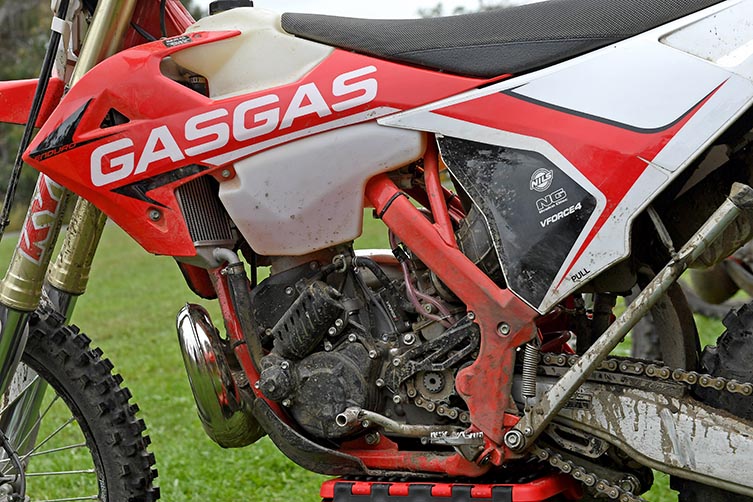
THE CONS
- Even with the slightly rich jetting the bikes ran at the launch (which tends to soften the power and take the edge off throttle response), both the EC250 and EC300 still have punchier, more aggressive power than their class counterparts. It’s a ‘traditional’ two-stroke style of power, which makes the bikes lively and exciting to ride – especially on flowing grasstrack – but not as easy to use in tight, technical terrain.
- There are no radiator protectors (and no crush-resistance built into the flimsy plastic louvres).
- The bashplate leaves the water-pump vulnerable to rock damage.
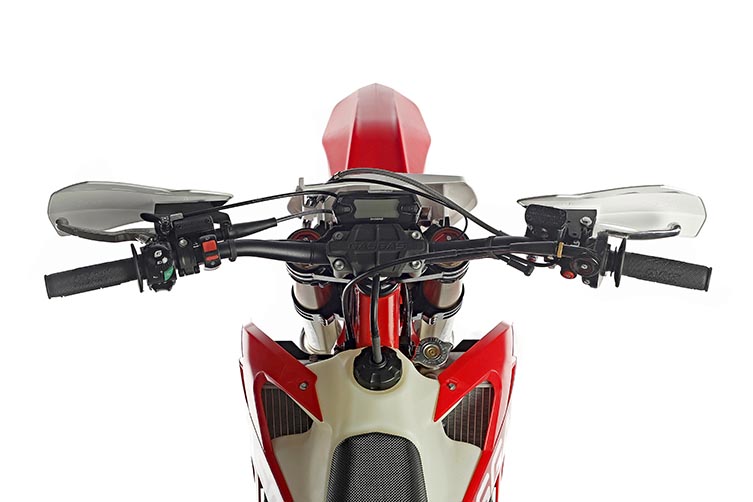
- The gearshift lever sits well proud of the ignition cover and appears susceptible to being snagged by sticks.
- The bolt-on electric-starter motor looks like a bit of an afterthought these days (because most of Gasser’s two-stroke counterparts now have their starter motors integrated into the engine cases or positioned under the cases, or both).
- The rear axle’s chain adjuster blocks are not reversible (meaning quick chain tension adjustment is not possible).
- The front Nissin brake is powerful and offers great feel, but isn’t it time Nissin introduced an OTF adjuster for the lever position? Brembo and Magura (and many brands used on mountain bikes) have had on-the fly adjuster dials/barrels for years. Similarly, it’s time Nissin’s rear brake got a separate adjuster for pedal height and freeplay.
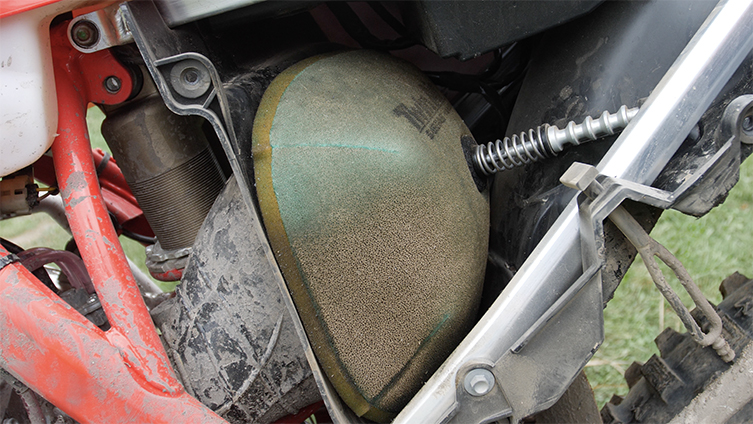
Stay tuned for a more detailed insight into the performance of Gasser’s 2019 250 and 300cc enduro weapons, plus some revealing interviews with the key people from Urban Motor Imports, the Australian distributors of the rejuvenated Spanish brand.
PRICING COMPARISON
It’s interesting that less than $100 separates the RRPs for comparable two-stroke models from Gas Gas, Beta and Sherco for 2019. And all three are significantly cheaper than the 2019-model KTM and Husqvarna equivalents (bearing in mind, the 2019 KTMs and Huskys are only available in fuel-injected guise which, in 2018, were $800-$1000 pricier than their carb-fed equivalents).
COMPONENT CHECK
At the media launch for the 2019 Gas Gas models, this comparative component spec table was wheeled out to reinforce the Spanish bikes’ value for money.
More on the 2019 Gassers
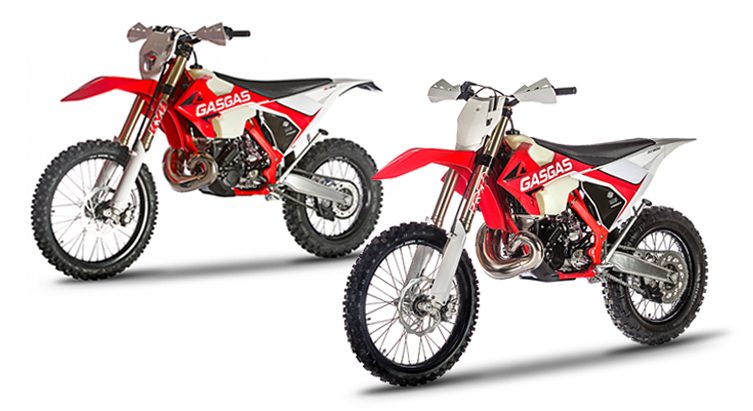
2019 GAS GAS: EC/XC UPGRADES
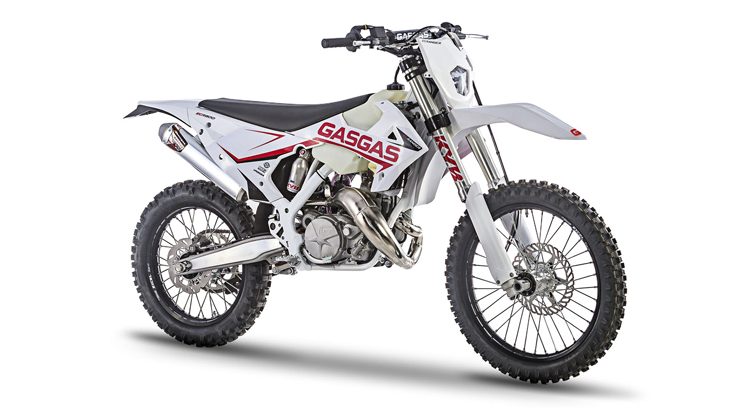
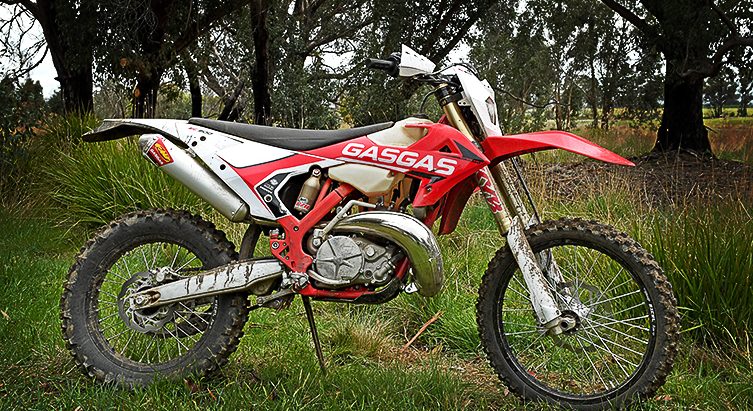

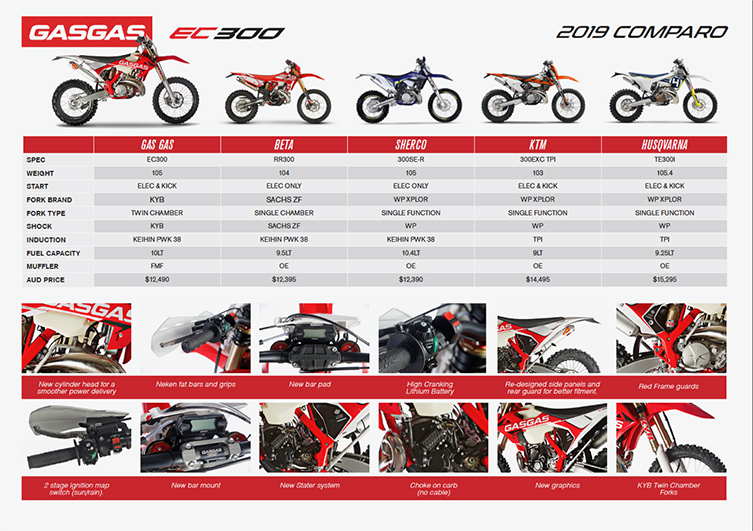

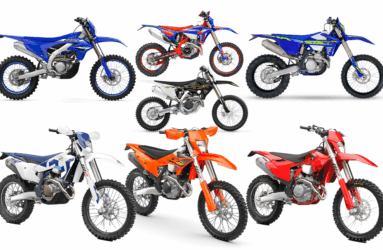



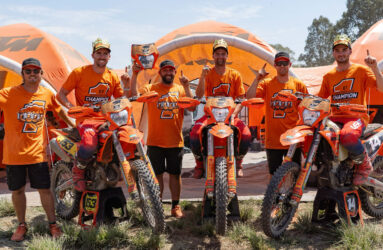
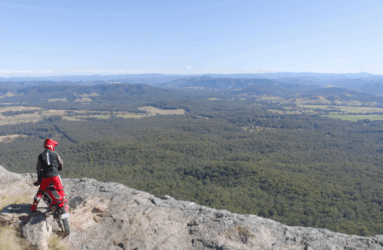

Be the first to comment...